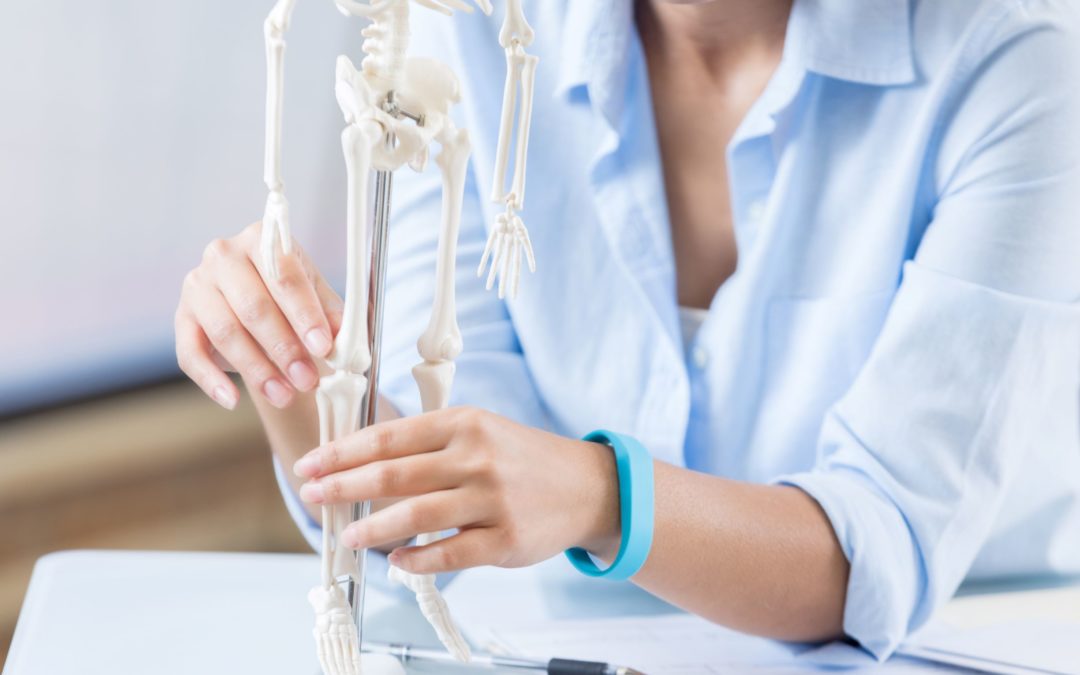Lying deep under your skin and tissue, bones are one aspect of our bodies that we may take for granted. Because they are invisible, we forget how vital they are to our quality of life. Fortunately, it’s never too early or too late to start giving them the attention they deserve, as just a little mindfulness can go a long way toward keeping your bones strong and preventing osteoporosis.
Osteoporosis Defined
Osteoporosis is a disease in which the density and quality of bone are reduced. Bones become more porous and fragile, increasing the risk for fractures. The likelihood of fractures increases with age in both men and women.
Women are at a greater risk of developing osteoporosis for a number of reasons. These include a decrease in estrogen levels during menopause, as well as having smaller, thinner bones than men do.
8 Ways to Help Keep Your Bones Strong

Staying active is one way to keep your bones healthy for several reasons, including improving coordination and balance.
1. Stay Active
When it comes to physical activity, your bones react similar to the way muscles do. When you exercise, your bones become stronger, build more cells, and become more dense, all of which can help prevent osteoporosis. Strength-building exercises specifically can be helpful, as it can replace your lost muscle mass and slow mineral loss in your bones.
Another benefit of exercise is that other areas of your body become stronger as well, which can improve balance and coordination. All of these factors combined could help prevent falls, as well as minimize the impact if you do fall.
2. Follow a Diet that Promotes Bone Health
Calcium, vitamin D, and magnesium are critical to bone health. Foods and drinks that are good for your bones include:
• Dairy products, including milk, cheese, and yogurt
• Sardines or canned salmon with bones
• Tofu
• Leafy, dark green vegetables
• Seeds
• Almonds
• Fatty fish
• Fortified cereal
• Egg yolks
• Legumes
• Whole Grain
• Avocado
3. Spend Time in the Sun
Here’s one way to keep your bones strong that you probably won’t mind: spending time in the sun. Contrary to popular belief, the sun itself doesn’t give you vitamin D. Instead, when your bare skin is exposed to the sun, a biological reaction occurs that leads to the additional absorption of vitamin D into your body. Vitamin D is essential for stronger teeth and bones, and it also supports the health of the immune system, brain, and nervous system.
4. Consider Taking Vitamins
There is some controversy about the effectiveness of vitamins, but vitamins may be especially helpful for individuals who are at an increased risk for osteoporosis. It’s difficult to consume enough of the necessary nutrients to keep your bones healthy through food and drink alone.

About 30 percent of our bones are water, so it’s important to drink water to keep bones and bone marrow functioning the way they should.
5. Drink Plain Water
It’s important to drink the recommended amount of water per day for many reasons, and better bone health is one of them. Water lubricates joints and helps bring calcium and other nutrients to your bones.
Although they may appear to be, bones are not dry. In fact, they are about 30 percent water, so the amount of water you drink helps keep bones and bone marrow functioning the way they should.
If adding flavor to water helps you to drink more of it, that’s OK. It’s important to note, however, that some researchers believe phosphoric acids in carbonated drinks interfere with calcium absorption, resulting in the loss of calcium from bone.
Senior men and women especially should make a conscious effort to drink the recommended amount of water daily. The ability to recognize thirst diminishes with age, leading to dehydration that may not even be noticed until more significant symptoms occur.
6. Reduce Soda and Alcohol Consumption
In addition to drinking more plain water, you may wish to reduce soda and alcohol consumption. While soda and alcoholic drinks may feel thirst-quenching in the moment, these drinks may dry out your body, which is why you are thirsty later.
7. Don’t Smoke
Smoking can negatively affect every part of your body, including your bones. Smoking reduces the blood supply to the bones, and nicotine slows the production of bone-forming cells. Smoking also decreases the absorption of calcium and breaks down estrogen in the body, which helps maintain a strong skeleton.
Additionally, smokers are at a higher risk for arthritis and tend to have more serious injuries. For example, rotator cuff injuries are nearly twice as large in smokers as they are in non-smokers.
8. Limit Caffeine Intake
Consuming a large amount of caffeine, such as more than three cups of coffee per day, may inhibit calcium absorption. Therefore, drinks that contain both caffeine and phosphoric acid could lead to more brittle bones.
Bone Mineral Density Testing
Individuals who have several of the above risk factors combined may be at greatest risk for osteoporosis. For that reason, it’s important to reduce harmful habits while making choices that help keep your bones strong.
Risk factors for osteoporosis include:
• Being a woman
• Menopause
• Being over 50 years old, for both men and women
• Family history
• A history of broken bones or having brittle bones
• Not getting enough calcium and vitamin D
• Not eating enough fruits and vegetables
• Consuming too much protein, sodium, and caffeine
• Not getting enough exercise
• Smoking
• Drinking too much alcohol
Professional bone mineral density testing is an effective way to determine if you are at risk for osteoporosis. The test uses X-ray technology to evaluate the amount calcium and other minerals in your bones. The technology can be used to scan your torso or extremities, depending on your doctor’s recommendation.
For more information about bone mineral density testing or how to best maintain bone health in order to prevent osteoporosis, contact Associated Orthopedists of Detroit, located here in the Shelby Macomb Medical Mall.




